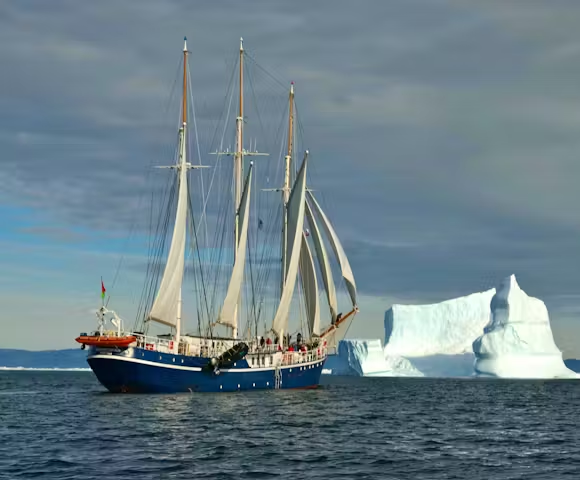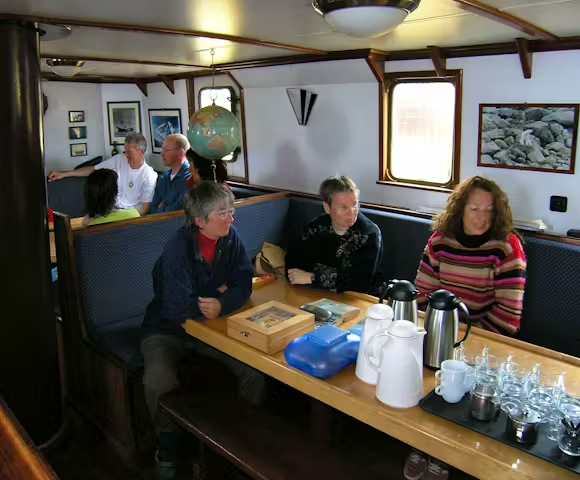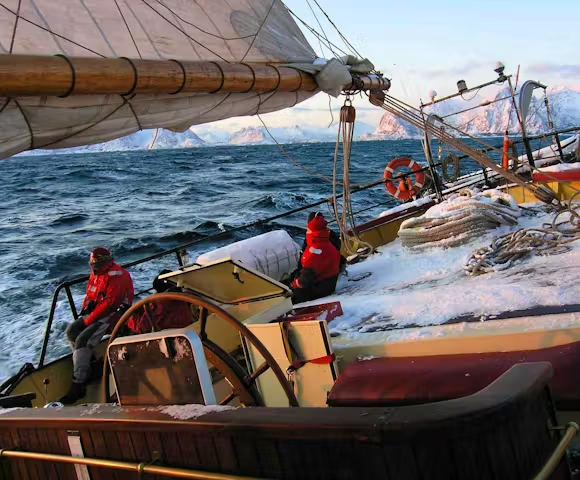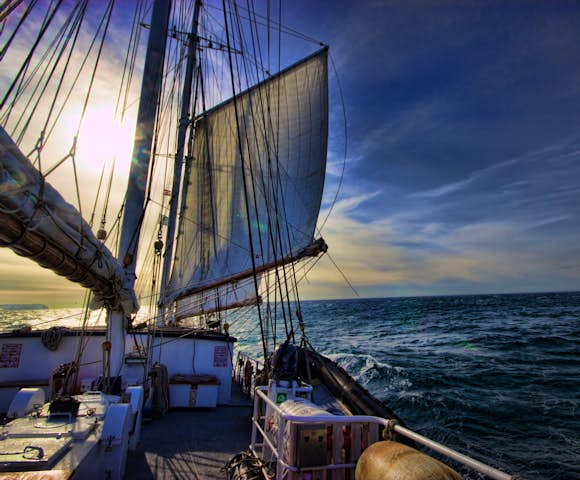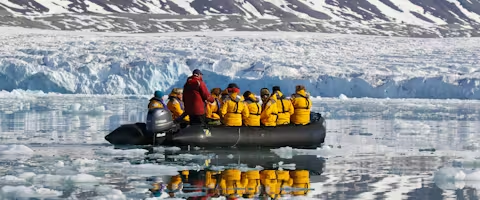North Svalbard Sailing Expedition - 8 or 11 Days - $4,200
Trip Summary and Itinerary Map
- Cruise along the pack ice of northern Spitsbergen for chances to see polar bears
- Sail into beautiful fjords crested with magnificent glaciers
- Choice of Arctic spring and summertime departures
- Sail onboard a schooner with capacity for 33 people
- Opportunity to be hands-on and help with the sailing of the ship
Start from Longyearbyen and end at Longyearbyen
Landmarks potentially visited on North Svalbard Sailing Expedition
Operator's Itinerary
Day 1: Longyearbyen
After arriving in Longyearbyen, Spitsbergen’s administrative centre, amble around this former mining town’s intriguing sights. You might like to visit the Svalbard Museum, which has an interesting collection on local history, the mining industry and polar exploration.
In the early evening, you'll set sail out of Isfjorden, where you might spot the first minke whale of your voyage. Into the evening, you'll set course for Trygghamna, seeing the remains of a 17th Century English whaling station and an 18th Century Pomor hunting station, both of which you can visit tomorrow morning.
Days 2 to 10: Exploring Spitsbergen
Your first full day of exploration begins with a hike from Trygghamna to Alkhornet, a dramatic seabird cliff where birds gather to stake out breeding spots. Keep an eye out below too – Arctic foxes are often spotted here, and if the snow isn’t too deep, you might see reindeer grazing on the rich vegetation.
From there, you’ll sail into Fuglefjorden, flanked by the stunning glaciers of Svitjodbreen and Birgerbukta. These areas are prime nesting grounds for great skuas, and there’s always a chance of spotting a polar bear. On the shores of Birgerbukta, you’ll find remnants of 17th Century Basque ovens once used for rendering whale blubber.
Next up is Ytre Norskoya, a small island doubling up as a Dutch whaling lookout for many years. You can still follow the historic paths to the summit, passing bustling bird cliffs along the way. Onshore, more 17th Century blubber ovens remain, along with the graves of about 200 Dutch whalers. Arctic skuas and common eiders nest among these eerie but fascinating relics.
Then it’s on to Raudfjorden, on the northern coast of Spitsbergen. It’s a brilliant place to take in the sweeping glaciers, with regular sightings of ringed and bearded seals, seabird colonies, and the occasional beluga whale or polar bear. At Alicehamna and Buchananhalvøya, you’ll also get fantastic views of the region’s geology.
If ice conditions allow, you might land on the north side of Graahuken, a wide-open tundra stretch, and walk to Hyttesletten. This plain is a favourite grazing spot for reindeer and a breeding ground for various waders. Nearby lakes often host red-throated divers and king eiders.
Depending on the sea ice, you might sail into Liefdefjorden to land at Texas Bar and cruise past the massive face of Monaco Glacier, which is just over 3 miles (5 km) long. Thousands of kittiwakes feed in the waters here, and polar bears often hunt along the glacier’s base. If the ice blocks access early in the season, your route may instead follow the west coast of Spitsbergen.
As you head south, you’ll visit Magdalenafjorden, known for its breathtaking glaciers. A stop at Gravneset reveals the remains of English whaling operations from the 1600s, and you’ll likely see sizeable colonies of little auks.
Continuing northward, you’ll reach Kongsfjorden and Krossfjorden, where the plan is to explore Ny London, the remains of early 20th Century marble mining operations. Then there’s Ny-Ålesund, the northernmost settlement in the world. It’s also home to scientific research stations and the anchor mast of the airship Norge, which completed the first flight across the North Pole to Alaska in 1926. Krossfjorden offers striking views of glaciers and towering peaks, too.
On the return leg south, you may land in Forlandsundet at Sarstangen, a known walrus haulout. Alternatively, you might explore the coast of Engelskbukta and take a scenic walk to Hornbaekbukta.
Your final stop is Bohemanflya, a sweeping tundra landscape rich in birdlife (depending on the season) and known for its impressive coastal rock formations. In Gipsvika, you’ll go ashore near Templet, a dramatic mountain of eroded sedimentary rock dating back around 290 million years to the Upper Carboniferous period.
Day 11: Disembark
On your final day, you’ll leave the schooner in Longyearbyen as your adventure reaches its end.
About The Ship
- Sail in Arctic waters aboard a three-masted schooner built over 100 years ago
- Massive appeal for active travellers and avid sailors alike
- Sail with just 33 guests with a professional crew of 12
- Arctic travel doesn’t get much more exclusive than this
- Enjoy land-based excursions accompanied by your expeditionary staff
Prices, Departures and Inclusions
Prices quoted below are per person based on 2 people sharing. Cabin availability changes all the time so please contact us for up-to-date details and information on specific cabin availability.
* Note: Prices are per person. Paid in USD ($) - figure above is based on today's exchange rate. Actual cost $4200
Additional Notes
The 29th May 2026 departure is 8 days long. All other voyages are 11 days long.
The 18th June 2025 departure is a special Summer Solstice voyage
Single Supplement And Child Policy
There is no single supplement for passengers willing to share a cabin. For those who want their own cabin, the single supplement in a twin cabin is 1.7 times the cost of sharing with another passenger.
Includes
- Voyage aboard the vessel as indicated in the itinerary
- Accommodation during the voyage on full board basis
- All shore excursions and zodiac activities
- Educational lectures by expert onboard polar guides
- Complimentary loan of snowshoes
- Access to an onboard doctor and basic medical services
- Comprehensive pre-departure information
- Port taxes and any entry fees to historic landing sites
Excludes
- Flights to and from points of embarkation/disembarkation
- Any additional services before and after your voyage
- Transfers not specific to the itinerary
- Travel insurance
- Optional adventure activities
- Any visa, passport and vaccination expenses
- Airport arrival or departure taxes
- Items of a personal nature: laundry, beverages, etc
- Customary staff gratuity at the end of the voyage
- Additional onboard purchases (i.e. gift shop)


